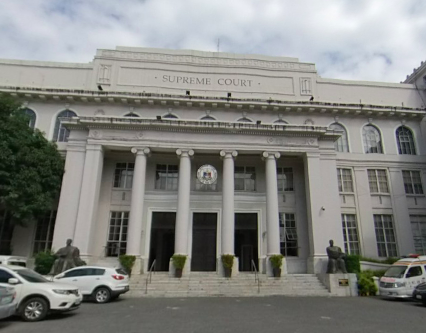SC upholds Senate role in treaty abrogation

Screenshot of the Supreme Court main building
Contrary to the claim of presidential spokesperson Harry Roque, Sen. Franklin Drilon argued that the Supreme Court expressly “recognized the role and power of the Senate in treaty abrogation.”
Drilon, the leader of the Senate minority, refuted Roque’s interpretation that the high court “virtually” ruled that Senate concurrence was not necessary in withdrawing from treaties or international agreements although the high court dismissed the petition only because it was already moot.
“While the Supreme Court dismissed the petition questioning the validity of the Philippine government’s withdrawal from the Rome Statute for being moot and academic, the Supreme Court affirms the need for Senate’s concurrence in the withdrawal from treaties and international agreements,” Drilon said.
In its decision made public on Wednesday, the high tribunal said it had no authority to invalidate the Philippines’ withdrawal from the Rome Statute, the founding treaty of the International Criminal Court, since it was already accepted and acknowledged by the United Nations, and that the government had met the requisites in annulling the agreement.
No sole authority
But the Supreme Court recognized the Senate’s authority in rescinding treaties it previously approved, declaring that the President’s prerogative to unilaterally set aside an international agreement was “not absolute.”
“The President had no sole authority and the treaty negotiations were premised not only upon his or her own diplomatic powers, but on the specific investiture made by Congress,” the court said.
“In sum, at no point and under no circumstances does the President enjoy unbridled authority to withdraw from treaties or international agreements,” it declared.
‘Powers not absolute’
Drilon said an earlier jurisprudence also “recognized and upheld the role and power of the Senate as the partner of the President, not only in treaty making but in treaty abrogation as well.”
He quoted from the Supreme Court’s ruling in Pangilinan v. Cayetano that “the President’s discretion on unilaterally withdrawing from any treaty or international agreement is not absolute.”
“As primary architect of foreign policy, the President enjoys a degree of leeway to withdraw from treaties. However, this leeway cannot go beyond the President’s authority under the Constitution and the laws. In appropriate cases, legislative involvement is imperative,” the court had said.
Drilon said the court might have dismissed the petition on procedural grounds “but the decision made a doctrinal pronouncement, by acknowledging and explicitly ruling that the President may be the ‘chief architect of foreign policy’ but his powers are not absolute.”
“The decision affirms that the realm of treaty making and abrogation is not exclusive to the President. It is a shared power with the Senate,” he said.
Drilon said the latest ruling had “far-reaching consequences” as “it strengthens the system of check and balance.”
“The ruling will provide stability insofar as our treaty obligation is concerned. This is a win for the Filipino people as treaties will not be subject to the caprice of one man,” he said.